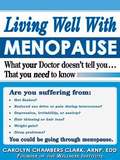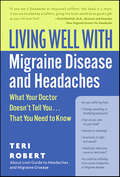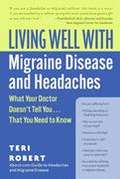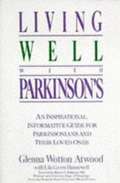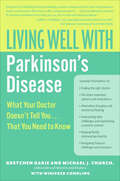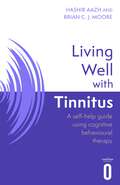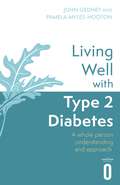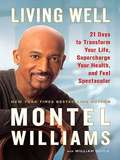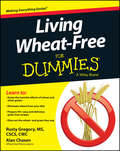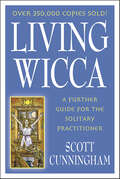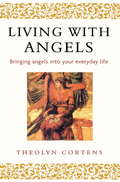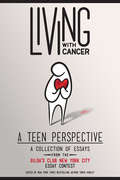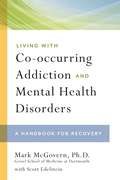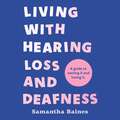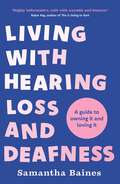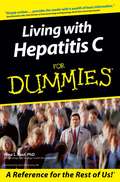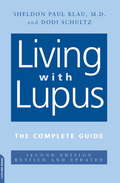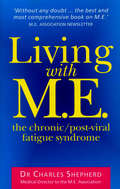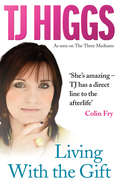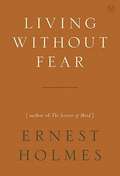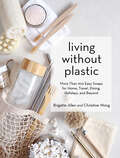- Table View
- List View
Living Well with Menopause: What Your Doctor Doesn't Tell You That You Need to Know
by Carolyn Chambers ClarkNurse and educator describes a thorough holistic approach to menopause. Gives advice on hot flashes, emotional changes, pain, fatigue, weight gain, decreased sex drive, bladder difficulty, insomnia, fuzzy thinking, and more.
Living Well with Migraine Disease and Headaches: What Your Doctor Doesn't Tell You . . . That You Need to Know (Living Well)
by Teri RobertFor millions of Americans, Migraine disease, tension headaches, and other headaches are a debilitating part of every day. Teri Robert has been there—in fact, she experienced her first Migraine at age six. Now, in this groundbreaking holistic guide to the diagnosis and treatment of headaches and Migraine disease, she brings a patient-empowering message to all headache sufferers: you don't have to live with daily pain. She provides you with all the information you need to know about getting the help you need, including:Understanding side effectsTreatments for long-term reliefRisks and symptomsIdentification of the various types of headachesTraditional and alternative therapiesInformation on finding health care practitioners and supportNumerous case studies and expert advice
Living Well with Migraine Disease and Headaches: What Your Doctor Doesn't Tell You... That You Need to Know
by Teri RobertFor millions of Americans, Migraine disease, tension headaches, and other headaches are a debilitating part of every day. Teri Robert has been there -- in fact, she experienced her first Migraine at age six. Now, in this groundbreaking holistic guide to the diagnosis and treatment of headaches and Migraine disease, she brings a patient-empowering message to all headache sufferers: you don't have to live with daily pain. She provides you with all the information you need to know about getting the help you need, including: Understanding side effects Treatments for long-term relief Risks and symptoms, Identification of the various types of headaches, Traditional and alternative therapies, Information on finding health care practitioners and support, Numerous case studies and expert advice.
Living Well with Parkinson's
by Glenna Wotton Atwood Lila Green HunnewellPractical suggestions for everyday living, nutrition, exercise, attitude, dealing with doctors, medications, therapies, support grou Oneps, organizations in the US and Canada. One of the authors has Parkinson's and tells of her own experiences. No profanity or violence. No explicit sexual words.
Living Well with Parkinson's Disease: What Your Doctor Doesn't Tell You....That You Need to Know
by Winifred Conkling Michael J. ChurchA complete guide to Parkinson’s from two people with the disease who cofounded a national support and advocacy organization.In Living Well with Parkinson’s Disease, Gretchen Garie and Michael J. Church, a couple who both have Parkinson’s and live daily with the effects of the disease, thoroughly discuss diagnosis, treatment options, and the emotional consequences of this difficult illness. With a conversational, pragmatic, and personal tone, they offer advice on such topics as:How Parkinson’s disease affects relationshipsThe role of diet, supplements, and rest and relaxationStrategies for navigating professional life and the maze of the health-care systemHandling everyday challenges such as buttoning a shirt or rolling over in bedAnd more!Compassionate and inspiring, Living Well with Parkinson’s Disease offers knowledge and wisdom from those who understand the challenges of dealing with Parkinson’s every day.“[Gretchen and Michael’s] firsthand knowledge as patients, coupled with their years of experience as experts and advocates, allow them to offer a unique perspective. Using the information provided by Gretchen and Michael in this book, you, too, can live well with Parkinson’s disease.” —John D. Campbell, MD, neurologist and medical director for PASFL, the Parkinson’s Association of Southwest Florida
Living Well with Tinnitus: A self-help guide using cognitive behavioural therapy (Living Well #1)
by Brian C.J. Moore Hashir Aazh'With real life examples to guide the reader and proven cognitive behavioural techniques, this will help people to overcome the distress associated with tinnitus and live a meaningful life'Dr Rory Allott, Greater Manchester NHS Foundation TrustWorldwide, about one billion people experience tinnitus at some point in their life. It is a life-changing experience for many of them. Learning effective management strategies in a timely fashion is the key to dealing with this difficult condition.This book combines cutting-edge knowledge of auditory science and theoretical frameworks in modern psychology with insight and real-life, human examples from clinical practice. Packed with metaphors and practical tips, the authors aid understanding of complex concepts by introducing an accessible and entertaining cast of characters from history and fiction, from Beauty and the Beast to Moby Dick, from Dante to Muhammad Ali, and from Sigmund Freud to Rumi.By following the advice in this book, you will:· Gain a realistic picture of what the recovery from tinnitus-related distress looks like· Learn how to go beyond the difficulties and annoyance caused by tinnitus and pay attention to the meanings behind those experiences· Develop skills that are proven to help on your journey.Everything that you need to know about living well with tinnitus is presented in ten steps!Living Well self-help guides use clinically proven techniques to treat long-standing and disabling conditions, both psychological and physical.Series Editors: Professor Kate Harvey and Emeritus Professor Peter Cooper
Living Well with Tinnitus: A self-help guide using cognitive behavioural therapy (Living Well #1)
by Brian C.J. Moore Hashir Aazh'With real life examples to guide the reader and proven cognitive behavioural techniques, this will help people to overcome the distress associated with tinnitus and live a meaningful life'Dr Rory Allott, Greater Manchester NHS Foundation TrustWorldwide, about one billion people experience tinnitus at some point in their life. It is a life-changing experience for many of them. Learning effective management strategies in a timely fashion is the key to dealing with this difficult condition.This book combines cutting-edge knowledge of auditory science and theoretical frameworks in modern psychology with insight and real-life, human examples from clinical practice. Packed with metaphors and practical tips, the authors aid understanding of complex concepts by introducing an accessible and entertaining cast of characters from history and fiction, from Beauty and the Beast to Moby Dick, from Dante to Muhammad Ali, and from Sigmund Freud to Rumi.By following the advice in this book, you will:· Gain a realistic picture of what the recovery from tinnitus-related distress looks like· Learn how to go beyond the difficulties and annoyance caused by tinnitus and pay attention to the meanings behind those experiences· Develop skills that are proven to help on your journey.Everything that you need to know about living well with tinnitus is presented in ten steps!Living Well self-help guides use clinically proven techniques to treat long-standing and disabling conditions, both psychological and physical.Series Editors: Professor Kate Harvey and Emeritus Professor Peter Cooper
Living Well with Type 2 Diabetes: A Whole Person Understanding and Approach (Living Well)
by Pamela Myles-Hooton Dr John GedneyA practical, self-help guide for living well with Type 2 Diabetes (T2D) In the last forty years, we have seen an astounding rise in the prevalence of T2D in most countries. There are thought to be close to half a billion people affected worldwide. Traditionally thought of as a disease of mid-life and old age, both T2D and the metabolic markers of future disease are now increasingly being seen in young people, children and even infants. The burden of this disease is huge at all levels − for healthcare spend and for added risk of other medical problems. Other than its physical impacts, more than a third of people with T2D are said to experience psychological problems related specifically to the condition. We are now at a crossroads in understanding the science behind T2D with a more focused approach emerging. Research and practice are challenging the traditional way in which we approach and manage T2D − as well as better understanding how to prevent it altogether. By following the advice in this book, you will: · Better understand and be empowered to control your metabolic health · Learn how to prevent, reverse, or improve, and better manage your T2D Living Well self-help guides use clinically proven techniques to treat long-standing and disabling conditions, both psychological and physical.
Living Well with Type 2 Diabetes: A Whole Person Understanding and Approach (Living Well)
by Pamela Myles-Hooton Dr John GedneyA practical, self-help guide for living well with Type 2 Diabetes (T2D) In the last forty years, we have seen an astounding rise in the prevalence of T2D in most countries. There are thought to be close to half a billion people affected worldwide. Traditionally thought of as a disease of mid-life and old age, both T2D and the metabolic markers of future disease are now increasingly being seen in young people, children and even infants. The burden of this disease is huge at all levels − for healthcare spend and for added risk of other medical problems. Other than its physical impacts, more than a third of people with T2D are said to experience psychological problems related specifically to the condition. We are now at a crossroads in understanding the science behind T2D with a more focused approach emerging. Research and practice are challenging the traditional way in which we approach and manage T2D − as well as better understanding how to prevent it altogether. By following the advice in this book, you will: · Better understand and be empowered to control your metabolic health · Learn how to prevent, reverse, or improve, and better manage your T2D Living Well self-help guides use clinically proven techniques to treat long-standing and disabling conditions, both psychological and physical.
Living Well: 21 Days to Transform Your Life, Supercharge Your Health, and Feel Spectacular
by William Doyle Montel WilliamsMontel Williams? New York Times bestselling battle plan for better living. Now in paperback! In Living Well, Montel explains the science behind his successful battle against multiple sclerosis, interviewing a global ?SWAT Team? of doctors, scientists, and researchers, and reveals the amazing effects of healthy eating and regular exercise. Most importantly, Montel shares his groundbreaking 21-Day Living Well Food and Workout Program? a hard-hitting health plan of diet changes, a step-by-step exercise plan, and the gradual addition of raw and whole foods to daily menu plans. This three-week regimen forms the cornerstone of Montel?s successful dietary health plan. Also included are simple, wholesome recipes that are as healthful as they are delicious. For anyone who wants to fight obesity, cancer, heart disease, and neurological diseases like Parkinson?s, Alzheimer?s, or multiple sclerosis?or if they just want to feel spectacular every day?it?s time to push life to the next level, by Living Well with Montel!
Living Wheat-Free For Dummies
by Rusty Gregory Alan ChasenYour trusted guide to living wheat-freeWheat is one of the largest contributors to the nationwide obesity epidemic--and its elimination is key to dramatic weight loss and optimal health. Living Wheat-Free For Dummies exposes the harmful effects of wheat/grains, sugar, and vegetable oils and provides you with a user-friendly, step-by-step plan to navigate a new, wheat/grain-free lifestyle.This information-packed guide explains why you should eliminate the trifecta of wheat/grains, sugar, and vegetable oils, what this diet looks like, and how to smoothly transition into this new dietary way of living. Whether you suffer from a wheat allergy, intolerance to grains, or just want to cut out inflammation-causing foods from your diet, Living Wheat-Free For Dummies gives you the tools and tips to improve your overall health. You can also find forty plus delicious, easy, wheat/grain-free ideas for any meal and guidelines for dining out. 40-plus delicious, easy recipes that are free of wheat/grains, sugar, and vegetable oilsGuidelines for dining out wheat/grain-freePractical techniques for making the lifestyle a permanent changeExercise programs for all levels that maximize weight loss efforts and optimal health If you're looking to adopt a wheat/grain-free diet and lifestyle, this hands-on, friendly guide has you covered.
Living Wicca: A Further Guide for the Solitary Practitioner
by Scott CunninghamA follow-up to Cunningham's Wicca for the Solitary Practitioner.
Living Wicca: A Further Guide for the Solitary Practitioner
by Scott CunninghamA classic introductory to the Craft for the solitary Wiccan practitioner, featuring essays on essential topics and a collection of daily prayers & rituals.Selling more than 200,000 copies, Living Wicca has helped countless solitary practitioners blaze their own spiritual paths. Let the wise words of Scott Cunningham guide you toward a new level of practice.Living Wicca takes a philosophical look at the questions, practices, and differences within Witchcraft. You’ll learn how to create your own rituals and symbols, develop a book of shadows, and even become a high priest or priestess. Also covered in this Scott Cunningham classic are tools, magical names, initiation, the Mysteries, 120 Wiccan symbols, and the importance of secrecy in your practice.“Living Wicca is . . . an excellent complement to the lessons in Wicca.” —United Pagan Ministries“Living Wicca is a wonderful legacy. . . . Don’t miss this book.” —Children of the Moon“This is a comprehensive guide for solitaries written in a very easy style. . . . Recommended.” —The Cauldron, A Pagan Forum“Whether a solitary or in a group, whether student or teacher, Living Wicca is not to be missed.” —Accord
Living With Angels: Bringing angels into your everyday life
by Theolyn CortensIn this fascinating and informative guide, angel expert Theolyn Cortens helps you to bring angels into your life. Living With Angels offers a practical introduction to angels and how to experience and communicate with them, as well as easy-to-follow exercises on how to contact your guardian angel. You will learn: how to call and work with your guardian angel and the archangel of your zodiac sign; how to call on angels and archangels for specific purposes, including protecting your family, travelling in safety, or nurturing close relationships; how you can work with angels to create a better life for yourself and others
Living With Angels: Bringing angels into your everyday life
by Theolyn CortensLiving With Angels offers a practical introduction to angels and how to experience and communicate with them, as well as easy-to-follow exercises on how to contact your guardian angel. You will learn: how to call and work with your guardian angel and the archangel of your zodiac sign; how to call on angels and archangels for specific purposes, including protecting your family, travelling in safety, or nurturing close relationships; how you can work with angels to create a better life for yourself and others
Living With Cancer
by Tonya HurleyLiving with Cancer presents the winners of the Gilda's Club® New York City teen essay contest, which put to its young writers the challenge of expressing what it feels like to LIVE with cancer; not to struggle with cancer, or even understand it, but simply to record the honest experience of living with it, alongside it. These essays give voice to teens whose lives and the lives of those they love have been affected by cancer, expressing their experiences with bravery, humor, and above all, honesty. These diverse and inspiring accounts will impress upon readers the openness and emotional maturity of their teen authors, who have found a place in both Gilda's Club® and within these pages to let go, to be themselves, and to never face cancer alone.Tonya Hurley is a New York Times and international bestselling author of the ghostgirl series and The Blessed trilogy. Her books are published in nearly 30 countries and in more than 20 languages. Ms. Hurley has worked in virtually every aspect of teen entertainment: creating, writing, and producing two hit TV series; writing and directing several acclaimed independent films, music videos and videogames. She is a contributor to the Huffington Post, an active member of the Writer's Guild of America, a member of the Horror Writers Association and has been involved in the Gilda's Club® NYC Teen Essay Contest since its inception. Gilda's Club® New York City is named after Gilda Radner, a brilliant comedian and one of the original cast members of Saturday Night Live. In 1986, she was diagnosed with ovarian cancer and died at the age of 42. During her illness, Gilda was part of a cancer support community which inspired her dream that anyone touched by cancer would receive the kind of emotional and social support she found there. In June, 1995 Gilda's Club® New York City opened its signature Red Door-her legacy to everyone living with cancer. Today, Gilda's Club® is a place where anyone touched by cancer...women, men, teens, and children, along with their families and friends can find FREE cancer support. The social and emotional support that is available to all members includes support and networking groups, educational lectures, workshops, and social activities-all in a beautiful, homelike setting in their West Village clubhouse and satellite locations throughout New York City. Thanks to the generous support of friends, corporations and foundations, we have served over 7,200 members in Manhattan, Brooklyn, Queens and the Bronx since we opened our signature Red Door in 1995. Visit us at http://www.gildasclubnyc.org/.
Living With Co-occurring Addiction And Mental Health Disorders: A Handbook For Recovery
by Scott Edelstein Mark McGovernAbout eleven million people in North America have a substance use disorder and at least one other mental health disorder. Those who struggle with this combination may be faced with a powerful recipe for destruction, especially self-destruction. The good news is that there is help. This handbook draws from an evidence-based program by a team at the Geisel School of Medicine at Dartmouth, internationally-recognized pioneers in the integrated treatment of co-occurring disorders. Co-occurring Addiction and Mental Health Disorders is designed to inform and empower those with such "dual disorders". Author Mark McGovern shows how they can make informed choices about their own treatment and, together with a trained clinician, shape a program that works. Key topics include: getting an assessment; reviewing treatment options; selecting the right treatment team; setting achievable goals and making positive changes with cognitive-behavioral therapy; building a support network of family and friends; and connecting with others recovering from co-occurring disorders. Informative, thorough, and easy to follow, this book has helped many people with co-occurring disorders thrive and be their own best recovery advocates.
Living With Hearing Loss and Deafness: A guide to owning it and loving it
by Samantha BainesA warm and down-to-earth exploration of hearing loss and deafness.Featuring the author's own experiences of deafness, this audiobook is about how to understand, live and thrive with hearing loss - a humorous yet informative place to turn for the millions of people in the UK who have hearing loss or deafness. Including interviews with experts from the RNID, audiologists, deaf activists and people who use and teach sign language, as well as facts and anecdotes about:* The first signs of hearing loss* Tinnitus* What to expect at a hearing test* Will I lose my job?* What are hearing aids and why do you need them* Top fears about hearing aids* Deaf dating* Lipreading* What is sign language?* What not to say to someone with hearing loss* Supportive charities and organisations(P) 2023 Headline Publishing Group Ltd
Living With Hearing Loss and Deafness: A guide to owning it and loving it
by Samantha Baines'Highly informative, told with warmth and humour' - Adam Kay, author of This is Going to Hurt'Heartfelt and hilarious - deaf awareness beautifully told through Sam's unique voice' - Laura Whitmore'This book is important' - Mark Atkinson, CEO of the Royal National Institute for Deaf People'Samantha is a strong and powerful woman who talks so openly about her life and about being a part of the deaf community. To have someone who wants to help and wants to make a difference is so important and Sam is that person.' - Gaby Roslin-----------------This is an all-you-need-to-know book about hearing loss and deafness, including facts, experiences and words of wisdom from experts at the RNID, audiologists, deaf activists and people who use and teach sign language. Having been on her own deaf journey, Samantha Baines has met wonderful, interesting, courageous people of all ages who also happen to be deaf. In this book, alongside the experts, she weaves together their insights and advice and, importantly, teaches those of us who aren't deaf, what it is like for those who are. Along the way, she looks at:* The first signs of hearing loss* What is tinnitus?* What to expect at a hearing test* Will I lose my job?* Am I disabled?* What are hearing aids and why do you need them?* Deaf dating* Lipreading* What is sign language?* What not to say to someone with hearing loss* And much more...'This is the book I wish I could have bought when the audiologist told me I needed a hearing aid, and I hope it can help you understand this new world you are stepping into. Welcome to the deaf club.' Samantha Baines
Living With Hepatitis C For Dummies
by Rn Nina L. Paul Gina PollichinoA comprehensive, empathetic guide for anyone suffering from this serious liver disease Approximately 4 million Americans and 170 million people worldwide suffer from hepatitis C, a viral liver disease that is treatable but not curable. It accounts for more than 40 percent of U. S. liver disease deaths-about 8,000 to 10,000 people annually-and is the most common reason for liver transplantation. This compassionate guide explains how hepatitis C affects the liver and the body and provides solid advice on today's treatment options-from drugs (and their side effects) to transplants and alternative therapies-as well as tips on dealing with the emotional and financial burdens the disease brings with it. Nina L Paul, PhD (New York, NY) earned her doctorate in infectious disease epidemiology and immunology from Yale University. She has researched viruses (human immunodeficiency virus and others) and the immune system.
Living With Lupus: The Complete Guide, 2nd Edition
by Sheldon BlauCompletely revised and updated, the definitive guide to maintaining a healthy lifestyle with lupus
Living With M.E.
by Dr Charles ShepherdIt is estimated that there are over 100,000 people suffering from M.E. in Britain today. Although not a new disease, M.E. (also known as 'yuppie flu') is at last being recognised and taken seriously. M.E. is short for MYALGIC ENCEPHALOMYSELITIS, a term which relates to the parts of the body affected: MYALGIC, the muscles; ENCEPHALO, the brain; and MYSELITIS, the nerves. Until recently, many people suffering from M.E. had great difficulty in finding a diagnosis and a way of dealing effectively with their chronic fatigue. This comprehensive guide provides much-needed information about the disease. It describes the symptoms of M.E., what triggers it and who can get it and also discusses additional problems such as sleep disorders, depression, pain in the joints and difficulties with the eyes, ears and balance. A well-researched, comprehensive guide, LIVING WITH M.E. is THE book to buy for any M.E. sufferer who wants information not speculation.
Living With the Gift
by TJ HiggsT J Higgs is one of the most celebrated psychic mediums in the UK, whose work has been featured on TV and in the national press. But she has overcome many obstacles to get where she is. A sensitive child, her unique psychic gift was not encouraged and, as she reveals, her life has not been easy. In fact, she believes that the challenges she has faced have played an essential part in making her the ground-breaking medium she is today.In this compelling book, Tracy Higgs - known affectionately by her fans as TJ - shares her story as well as heart-warming true tales from the afterlife. She also brings a lightness of touch, amazing accuracy and a fantastic sense of humour to her communications with the spirit world. Intuitive, witty and wise, she is a very modern medium. And she invites you now to engage with the Other Side in ways you never dreamed possible - to see the spirit world afresh through her eyes.
Living Without Fear
by Ernest HolmesA concise yet life-transforming work that will help many people move past the crippling fear that has stopped them from living their destined life. Does fear stop you from living your life to the fullest? In Living Without Fear, Holmes brilliantly navigates the reader through and away from anxiety, despair, and stress and toward the path to a richer experience in living. Learn to think constructively and creatively and to liberate yourself, finally, from all limitations so you can lead a life of greater health, happiness, and abundance. Living Without Fear is your guide to a life of peaceful selfactualization, free from the fear of what you don't want in your life, as well as from the fear of not receiving what you do want. This courageous, luminary book puts the power back into the reader's hands. Here is the end of fear. .
Living Without Plastic: More Than 100 Easy Swaps for Home, Travel, Dining, Holidays, and Beyond
by Christine Wong Brigette Allen“An eye-opening guide on how to lessen one’s dependence on plastics. . . . This is a clarion, convincing wake-up call to the scope of the global plastic problem and what readers can do about it. —Publishers Weekly <P><P>Embrace a plastic-free lifestyle with more than 100 simple, stylish swaps for everything from pens and toothbrushes to disposable bottles and the 5 trillion plastic bags we use—and throw out—every year. Use a natural loofah, not a synthetic sponge Buy milk in glass bottles or make homemade nut milk Opt for a waste-free shampoo bar Skip the printed receipt and opt for an email instead Wrap gifts beautifully with cloth <P><P>Organized into five sections—At Home, Food & Drink, Health & Beauty, On the Go, and Special Occasions—Living Without Plastic is a cover-to-cover collection of doable, difference making solutions, including a 30-Day Plastic Detox Program.
